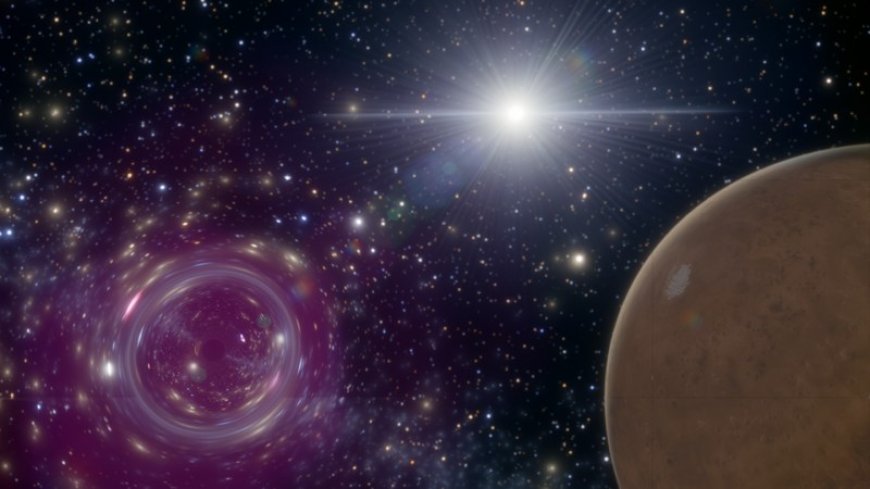How to spot tiny black holes that might pass through the solar system
Flybys of primordial black holes may occur once a decade. Tweaks to the orbits of planets and GPS satellites could give away their presence.

Primordial black hole flybys may maybe tweak the orbits of planets and GPS satellites
A primordial black hole inside the solar system (illustrated) may maybe make its presence known by altering the orbits of planets.
Benjamin V. Lehmann, with use of SpaceEngine@Cosmographic Software LLC

Black holes concerning the scale of a hydrogen atom may o.k. be careening at some stage in the solar system unnoticed. But their days of stealth shall be numbered.
Two teams of researchers propose tips on easy find out how to seek for these tiny, hypothetical objects, which may perhaps have the mass of an asteroid. Because they'd have formed inside the universe’s infancy, they are is often called primordial black holes.
In the event that they exist, primordial black holes in this mass range may maybe give a proof for some or the total universe’s dark matter (SN: eight/7/Sixteen). That unknown invisible source of mass exerts gravitational influence on galaxies and, perplexingly, seems to outweigh normal matter by about 6 to 1. Extensive searches for subatomic particles that can provide a proof for dark matter have come up empty, putting new do something about primordial black holes (SN: eight/26/24).
Black holes in general form when a dying big name collapses, resulting in a black hole without a longer lower than a couple of times the mass of the sun. Some scientists think smaller black holes may maybe have formed inside the early universe, maybe from quantum fluctuations that brought about portions of space to supply way without delay.
When the sort of primordial black hole passes in terms of a planet, it'll produce noticeable effects in spite of its tiny size, researchers report September 17 in Physical Review D. “The incredibly strong gravitational pull of this primordial black hole may most probably have the effect of constructing Mars wobble in its orbit across the sun,” says cosmologist Sarah Geller, a National Science Foundation fellow according to the University of California, Santa Cruz. Contained in the future, Geller and colleagues plan to partner with researchers who are skilled in doing detailed simulations of the solar system to dig at some stage in the data for wobbles.
Likewise, a primordial black hole flyby may maybe jostle GPS satellites and similar satellite networks, cosmologist Sébastien Clesse and colleagues report September Sixteen inside the same journal. If a primordial black hole with the mass of an asteroid buzzed Earth within thousands or hundreds of thousands of kilometers, satellites may maybe change altitude by a small but detectable amount. “That’s very exciting to remember that we now have some probes that can o.k. be used to in point of fact detect baby black holes inside the solar system,” says Clesse, of Université Libre de Bruxelles in Belgium.
Asteroid-mass primordial black holes may maybe whiz at some stage in the inner solar system only once a decade. Luckily, scientists have decades of knowledge on satellites’ trajectories. The same goes for Mars’ orbit, resulting from rovers and satellites across the planet.
Compared with the planetary wobble technique, the satellite search would be sensitive to primordial black holes of smaller masses. “It truly is a protracted way very complimentary,” says astrophysicist and metrologist Bruno Bertrand of the Royal Observatory of Belgium in Uccle, who coauthored the satellite paper.
Run-of-the-mill asteroids may maybe mimic the signature of the primordial black holes. But it surely the black holes would have speeds of about 200 kilometers per 2d and are to be had from outside the solar system. That’s rare for space rocks (SN: 9/12/19). “We have got never seen an object pass at some stage in the solar system that can maybe have the characteristics we'd associate with a black hole transit,” says physicist Ben Lehmann of MIT, a coauthor of the paper on the planetary method. To clinch the case, though, ideally scientists would detect a wobble in real time and check for any space rocks that can provide a proof for it.
Other effects that can tweak planetary orbits would also has to be accounted for, such as the solar wind of charged particles that streams out from the sun, says astrophysicist Andreas Burkert of Ludwig-Maximilians-Universität München in Germany, who changed into no longer involved with both studies. And the satellite technique may o.k. be especially demanding, he says, arguing that a primordial black hole passing close enough to Earth to detect may o.k. be an exceedingly rare event. So, in the mean time, Burkert says, “I don’t think it’s realistic.” But “I’m optimistic that it has to be that it's possible you may remember in some unspecified time at some point.”
More Stories from Science News on Physics
What's Your Reaction?



























































